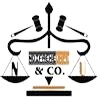Best Antitrust Lawyers in Uyo
Share your needs with us, get contacted by law firms.
Free. Takes 2 min.
List of the best lawyers in Uyo, Nigeria
About Antitrust Law in Uyo, Nigeria:
Antitrust law in Uyo, Nigeria is designed to promote fair competition in the marketplace by preventing monopolies, price-fixing, and other practices that harm consumers or limit competition. These laws are in place to ensure that businesses operate fairly and do not engage in practices that could harm consumers or other businesses.
Why You May Need a Lawyer:
You may need a lawyer in the field of Antitrust in Uyo, Nigeria if you are facing allegations of anti-competitive behavior, are involved in a merger or acquisition that may raise antitrust concerns, or if you believe your rights have been violated under antitrust laws. A lawyer can help you navigate complex legal issues and defend your interests in court.
Local Laws Overview:
In Uyo, Nigeria, the primary antitrust law is the Federal Competition and Consumer Protection Act (FCCPA) which prohibits anti-competitive practices such as price-fixing, bid-rigging, and abuse of dominance. The FCCPA also establishes the Competition and Consumer Protection Commission (CCPC) to enforce these laws and investigate violations.
Frequently Asked Questions:
1. What is considered anti-competitive behavior under Nigerian antitrust laws?
Anti-competitive behavior includes practices such as price-fixing, bid-rigging, and abuse of dominance that harm competition in the marketplace.
2. How can I report a potential antitrust violation in Uyo, Nigeria?
You can report a potential violation to the Competition and Consumer Protection Commission (CCPC) either online or by visiting their office in person.
3. What are the penalties for violating antitrust laws in Uyo, Nigeria?
Penalties for violating antitrust laws can include fines, injunctions, and other remedies as determined by the CCPC.
4. Can individuals file antitrust lawsuits in Uyo, Nigeria?
Yes, individuals who have been harmed by anti-competitive behavior can file private antitrust lawsuits in Nigerian courts.
5. How can a lawyer help me with an antitrust case in Uyo, Nigeria?
A lawyer can provide legal advice, represent you in court, and help you navigate the complexities of antitrust laws to protect your rights.
6. What is the role of the Competition and Consumer Protection Commission (CCPC) in Uyo, Nigeria?
The CCPC is responsible for enforcing antitrust laws, investigating violations, and promoting fair competition in the marketplace.
7. Are there any exemptions to antitrust laws in Uyo, Nigeria?
Some agreements or practices may be exempt from antitrust laws if they benefit consumers or contribute to economic efficiency.
8. What is the statute of limitations for antitrust violations in Uyo, Nigeria?
The statute of limitations for antitrust violations in Nigeria is typically within five years of the alleged violation.
9. Can foreign companies be held accountable for antitrust violations in Uyo, Nigeria?
Yes, foreign companies operating in Nigeria can be held accountable for antitrust violations under Nigerian law.
10. How can I file a complaint with the CCPC in Uyo, Nigeria?
You can file a complaint with the CCPC by submitting a written statement detailing the alleged antitrust violation, providing any evidence you have, and following any specific instructions provided by the Commission.
Additional Resources:
For more information on antitrust laws in Nigeria, you can visit the Competition and Consumer Protection Commission (CCPC) website at www.cpc.gov.ng or contact a legal professional specializing in antitrust law.
Next Steps:
If you believe your rights have been violated under antitrust laws in Uyo, Nigeria, it is important to seek legal advice from a qualified lawyer who can guide you through the legal process and help protect your interests. Contact a local law firm specializing in antitrust law to discuss your case and determine the best course of action.
Lawzana helps you find the best lawyers and law firms in Uyo through a curated and pre-screened list of qualified legal professionals. Our platform offers rankings and detailed profiles of attorneys and law firms, allowing you to compare based on practice areas, including Antitrust, experience, and client feedback.
Each profile includes a description of the firm's areas of practice, client reviews, team members and partners, year of establishment, spoken languages, office locations, contact information, social media presence, and any published articles or resources. Most firms on our platform speak English and are experienced in both local and international legal matters.
Get a quote from top-rated law firms in Uyo, Nigeria — quickly, securely, and without unnecessary hassle.
Disclaimer:
The information provided on this page is for general informational purposes only and does not constitute legal advice. While we strive to ensure the accuracy and relevance of the content, legal information may change over time, and interpretations of the law can vary. You should always consult with a qualified legal professional for advice specific to your situation.
We disclaim all liability for actions taken or not taken based on the content of this page. If you believe any information is incorrect or outdated, please contact us, and we will review and update it where appropriate.










